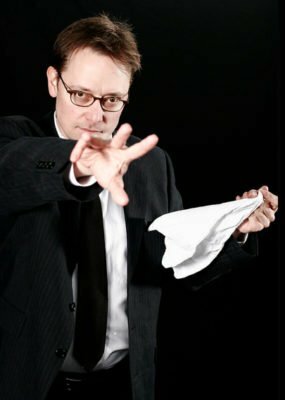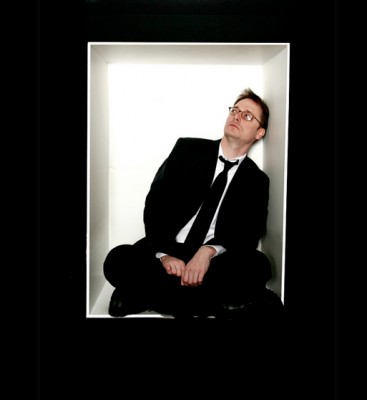Thom Pain (based on nothing)
Directed by Jeremy Wechsler
Starring Lance Baker
Produced by Theater Wit
“Think of me, f#@$&!$ around with your life, and try to smile.” -Thom Pain
It’s not especially out of the ordinary in the theater for there to be bouts of nervous laughter. But usually, it’s unintentional—the awkward byproduct of jokes gone awry, actors gone off-key or whole plays gone sadly off the rails. Rare is the play which demands nervous laughter. Insists upon it. Nay, even feeds off of it.
Hence the distinct boldness to playwright Will Eno’s Thom Pain (based on nothing), staged by Theater Wit as a “special encore presentation” of their hit 2007 production. Indeed, this penetratingly weird one-man show (featuring Lance Baker in a reprised performance) strives to engender the sort of audience responses most shows avoid like the plague: a bit of uncomfortable squirming, a lot of incredulous squinting, and frequent bursts of tense—even panicked—laughter. But Thom Pain gets away with it, largely because the inciting wound at the play’s core feels still so palpably fresh.
It begins with our anti-hero, Thom Pain—a narrator-cum-stand-up-comedian—walking onstage into pitch darkness. He attempts to light a cigarette and fails. Twice. An apt preview for what’s to come. “Do you like magic?” Pain asks. “I don’t. Enough about me. Let’s get to our story.”
 But getting to the story is easier said than done, and Thom Pain contains lots of fourth-wall-busting absurdist shtick. Fidgeting nervously with the cuff of his dress shirt, Pain wanders listlessly around a stage peppered with conspicuously placed ladders and Fresnel lanterns which together evoke the selfsame ‘whatever’ minimalism Pain so pointedly insists upon. When not offering bits of quirky observational humor delivered with a winking deadpan, Pain can be found begging the stage manager (fruitlessly) for a follow spot, making ambivalent sexual overtures to audience members, and announcing the (non)existence of a raffle.
But getting to the story is easier said than done, and Thom Pain contains lots of fourth-wall-busting absurdist shtick. Fidgeting nervously with the cuff of his dress shirt, Pain wanders listlessly around a stage peppered with conspicuously placed ladders and Fresnel lanterns which together evoke the selfsame ‘whatever’ minimalism Pain so pointedly insists upon. When not offering bits of quirky observational humor delivered with a winking deadpan, Pain can be found begging the stage manager (fruitlessly) for a follow spot, making ambivalent sexual overtures to audience members, and announcing the (non)existence of a raffle.
Interspersed throughout are Pain’s attempts to narrate two stories, both obliquely auto-biographical. The first—involving a little boy, a rain puddle, and a pet dog—is meant to invoke the early traumas of childhood. “Isn’t it wonderful how we never recover?” Pain asks, at once profoundly earnest yet also relishing in life’s ambivalences. In one remarkably dazzling passage, Pain recounts how the little boy once stumbled upon a hive of bees who proceeded to sting him to the point of an inflamed swelling. Convinced however that the intense pain originated from within his own body—and that the bees were attempting to soothe it—the little boy stuck his hand even further into the hive. The story is a potent metaphor for the act of excavation happening live on stage, as Pain digs deeper into his distressing past under the (knowingly false) pretense that it might bring him some kind of soothing comfort. But trauma once lived is never forgotten. Only laughed at.
Pain dovetails the little boy’s story with yet another of a failed love affair, affording an opportunity for some of Thom Pain’s more poignant reflections on loneliness, alienation, and hapless futility. And it’s from these moments that the real emotional center of the play slowly emerges. Pain refuses to whitewash his frustrations over being left alone, preferring to meet his newfound apathy head-on with incisive bits of dark humor. Psychologists have described humor as one of our ‘mature’ psychological defenses, and nowhere is that more evident than here. If we are, as an audience, willing to engage in bouts of nervous laughter, it’s only because Pain is himself all too willing to face his sorrow head-on and do what for many is the impossible—namely, to laugh at it.
Capturing the peculiar nuance of Pain’s voice is also easier said than done. Imagine a Woody Allen-esque neurotic with the darker—almost self-destructive—edge of Bill Hicks. Always refreshingly self-aware and frequently funny, Pain is also often meandering. In returning-director Jeremy Wechsler’s hands, Thom Pain has a notably extempore feel to it. Deliberately blurring the line between the scripted and the improvisational, there’s something remarkably present about Baker’s performance, every painful self-realization erupting to the surface as though fresh and for the first time.
darker—almost self-destructive—edge of Bill Hicks. Always refreshingly self-aware and frequently funny, Pain is also often meandering. In returning-director Jeremy Wechsler’s hands, Thom Pain has a notably extempore feel to it. Deliberately blurring the line between the scripted and the improvisational, there’s something remarkably present about Baker’s performance, every painful self-realization erupting to the surface as though fresh and for the first time.
Yet while this approach serves Thom Pain well when wanting to punctuate sudden outbursts of pained sincerity, it tends to be less effective during the plays more digressive moments. Even Baker looks occasionally lost among Pain’s scattered thoughts, and sometimes when the pacing would benefit from being taut and coherent, we find it sluggish and overly obscure. To his credit, Baker isn’t afraid to move Pain’s little games inward—keeping his cards close to his chest and his motivations (perhaps insidiously) vague. And though he’s thus successful in generating some mystery, it also has the effect of bringing the whole momentum to a grinding halt.
Undoubtedly, Thom Pain isn’t going to suit everyone’s tastes. Those who tend to dislike nervous laughter—that is, those who think pleasure and pain are mutually exclusive states—might find Pain’s sense of humor a bit too ambiguous in tone. But others should find in it an achingly honest and formally inventive examination of life’s traumas and the equally absurd means we employ to cope with them.
RECOMMENDED
Reviewed by Anthony J. Mangini
Reviewed Tuesday, June 2nd, 2013.
Running time is approximately 65 minutes with no intermission.
Thom Pain (based on nothing) runs until July 27th, 2013. Theater Wit is located at 1229 W. Belmont Ave. For tickets call (773) 975-8150

